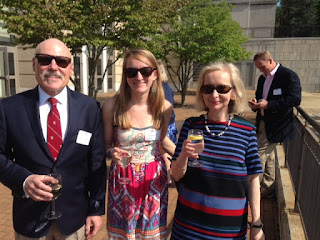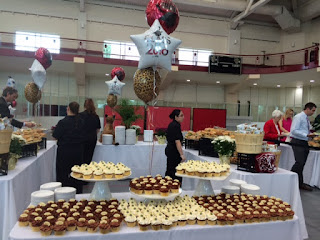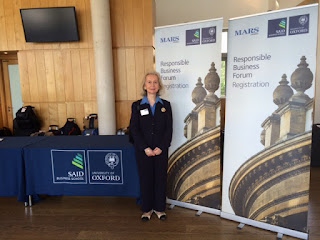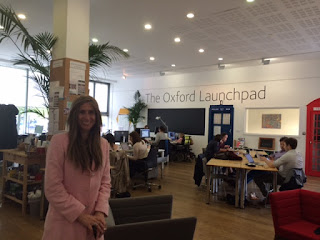The buildings at All Souls College are magnificent.
Below is a photo of my office door and a photo of the black gown that I wear to dinners at All Souls College. Seeing these upon my arrival made me feel immediately welcome.
The view from my office continues to inspire and I work to the sounds of the fountain in the garden outside of it.
I have been blogging about the experience but thought it made sense to take stock of what the first month has meant to me. Plus, I am often asked at the delicious fellowship meals (lunches and dinners) as to how my work is going and how am I doing. I am researching supply chains while a Visiting Fellow and, specifically, focusing on capturing quality and its preservation/degradation under competition in networks with applications including food. Given the wonderful fellowship here and community, which includes the delicious meals and conversations as well as tea and coffee that follow the topic is quite timely, I must say. I have enjoyed eating fish and chips with economics Fellows and Professor Glenn Loury of my alma mater, Brown University.
I've also enjoyed conversations including with Professor Ted Sider who is a Visiting Fellow with me and a notable UMass Amherst PhD alum (he is a philosopher). Pleasantly, Dr. Su Fang Ng, who is from the University of Oklahoma, and was a Radcliffe Institute for Advanced Study Fellow at Harvard University with me, in 2005-2006, is also a Visiting Fellow now at All Souls College.
The ambience of the tea room, as well as the dining halls, adds to the beauty and uniqueness of this truly special experience.
Since arriving at All Souls College, I have revised a paper on disaster relief, and resubmitted it to a journal, and have accepted an invitation to speak on the topic to the Management Science group at Lancaster University on June 28. I will also be speaking at the Centre for Transport Studies at Imperial College in London on June 9 on perishable product supply chains, which I am very much looking forward to. That evening I will be dining with one of my former doctoral students, and co-author of the Financial Networks book, Dr. Stavros Siokos, who is a very successful financier and a UMass Amherst alum. In July, I will be flying from England to speak at the EURO conference in Poznan, Poland, which should be fantastic and there we will be presenting also our latest cybersecurity research and also work on the Braess paradox and electronic circuits. Yes, applications of operations research are fascinating and widespread!
While at Oxford University, I am delighted that the Dynamics of Disasters volume, that I co-edited with Professors Ilias Kotsireas and Panos M. Pardalos, has been completed with a very nice Introduction. It contains 18 chapters. The volume has been shipped to our publisher, Springer.
I also had a chance to attend the Responsible Business conference at the Said School of Business that I blogged about.
In addition, I have been working on a paper on supply chain quality with application to food supply chains and am looking forward to the publication of the book, "Competing on Supply Chain Quality," co-authored with Dong Li, also to be published by Springer. In it, Oxford University is acknowledged and it is also acknowledged in the Dynamics of Disasters book.
Of course, while at Oxford, I have continued to monitor the progress of my doctoral students in Management Science at the Isenberg School of Management at UMass Amherst and am looking forward to Sara Saberi defending her dissertation later this summer.
The support provided by All Souls College plus the warmth of its staff surrounds us with a positive energy which challenges us to do our best work.
The beauty of the green spaces of Oxford and its various colleges also provide us with time to think as we walk and explore.
I am sure that the next month will bring all sorts of new experiences.










































































